- drambalkar@yahoo.co.in
- Mon - Sunday 10:00 AM - 02:00 PM
Plaque Psoriasis Treatment
What is Plaque Psoriasis?
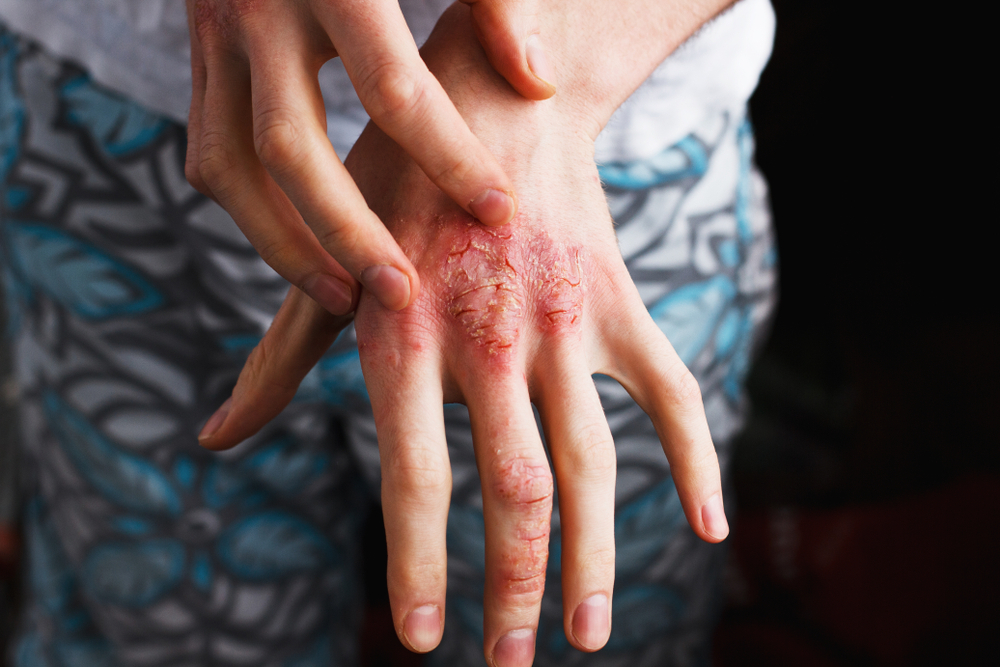
Plaque psoriasis is the most common type of psoriasis characterized by dry, itchy, raised skin patches known as plaques, which are covered with scales. These plaques can vary in number, ranging from a few to many, and typically appear on areas such as the elbows, knees, lower back, and scalp. The color of the patches may vary based on the individual’s skin color. In some cases, the affected skin might heal with temporary changes in color, known as post-inflammatory hyperpigmentation, especially in individuals with brown or Black skin.
When it comes to plaque psoriasis treatment in Mumbai, there are various options available to manage and alleviate symptoms. Topical treatments such as corticosteroids, vitamin D analogs, retinoids, and coal tar preparations can be used to reduce inflammation and promote skin healing. In more severe cases, phototherapy, which involves exposure to specific wavelengths of light, or systemic medications may be prescribed. Biologic drugs, which target specific immune system components, are also used in certain situations. It is important to consult with a healthcare skin ayurvedic doctor or dermatologist to determine the most suitable treatment plan for guttate psoriasis based on individual needs and receive the best possible plaque psoriasis cure in Mumbai.
Symptoms of Plaque Psoriasis
Psoriasis plaques appear as raised, inflamed, and scaly patches of skin that may also be itchy and painful. On Caucasian skin, plaques typically appear as raised, red patches covered with a silvery white buildup of dead skin cells or scale. On skin of color, the plaques may appear darker and thicker and more of a purple or grayish color or darker brown. While medical treatments are commonly prescribed, some individuals may also seek natural remedies for plaque psoriasis.
Plaques can appear anywhere on the body, although they most often appear on the scalp, knees, elbows, and torso. Plaques generally appear symmetrically on the body, affecting the same areas of the body on the right and left sides. It is recommended to consult with an ayurvedic skin specialist or dermatologist to develop a comprehensive skin plaque treatment plan tailored to your specific needs. They can guide you on the most appropriate treatment options and provide advice on integrating natural remedies, if suitable, into your psoriasis management routine.
Causes of Plaque Psoriasis
Doctors aren’t sure why people get plaque psoriasis. It’s considered an autoimmune disease. That means your immune system attacks healthy cells as if it’s fighting an infection. This causes new skin cells to grow much faster than normal, and they build up in thick patches.
Risk of Plaque Psoriasis
Plaque psoriasis is a chronic autoimmune skin condition that can be associated with several risks.
Here are some of the risks associated with plaque psoriasis:
Joint damage: Psoriatic arthritis is a common complication of plaque psoriasis. It can cause joint pain, stiffness, and swelling, and if left untreated, it can lead to permanent joint damage.
Cardiovascular disease: People with psoriasis are at a higher risk of developing cardiovascular disease, including heart attacks and strokes. The risk increases with the severity of psoriasis.
Depression and anxiety: Psoriasis can cause emotional distress and lead to depression and anxiety.
Obesity: People with psoriasis are more likely to be obese. Obesity can worsen psoriasis symptoms and increase the risk of other health problems, such as diabetes and high blood pressure.
Skin cancer: People with psoriasis may be at a slightly higher risk of developing skin cancer, especially if they have been treated with phototherapy or other immune-suppressing medications.
Ayurvedic Treatment for Plaque Psoriasis
The duration of psoriasis plaques can vary widely depending on several factors, including the type and severity of psoriasis, individual response to treatment, and adherence to management strategies. In general, psoriasis plaques can persist for weeks to months, and they may come and go in cycles. Mild plaques may resolve more quickly, while severe or chronic plaques may last longer and require ongoing management. It is important to consult with a healthcare professional for an accurate assessment of the condition and to develop a personalized treatment plan to effectively manage and minimize the duration of psoriasis plaques.
Plaque psoriasis itself is not contagious and cannot spread from person to person. However, the plaques can spread to different areas of the body in the same individual. This is known as Koebner phenomenon or the Koebner response, where psoriasis lesions develop at the site of skin injury or trauma.
To manage plaque psoriasis, avoid scratching, harsh products, extreme temperatures, stress, smoking, and excessive alcohol consumption. Consult a healthcare professional for appropriate plaque psoriasis treatment and management.
To prevent the spread of plaque psoriasis, avoid scratching, keep the skin moisturized, avoid triggers, follow treatment plans, maintain a healthy lifestyle, and have regular check-ups with a healthcare professional.
The healing time for plaque psoriasis can vary widely depending on various factors, including the severity of the condition, individual response to treatment, and adherence to management strategies. In general, plaque psoriasis may take several weeks to months to heal. Mild cases of plaque psoriasis may heal more quickly, while severe or chronic cases may require ongoing management and take longer to heal. It is important to consult with a healthcare professional for an accurate assessment of the condition and to develop a personalized treatment plan to effectively manage and promote healing.
Plaque psoriasis is a chronic autoimmune condition that affects the skin, causing thick, red, and scaly patches. While not life-threatening, it can significantly impact quality of life and is associated with other health conditions. Close collaboration with healthcare professionals is crucial for effective management.
Plaque psoriasis is a chronic condition with no known cure, but effective treatment options can manage symptoms and improve quality of life. Consultation with a skin specialist is important for personalized treatment and ongoing management.
Plaque Psoriasis Treatment Before & After Results
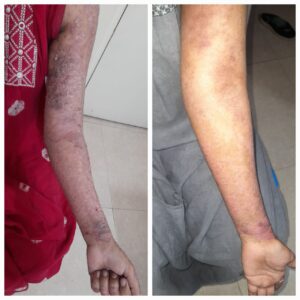
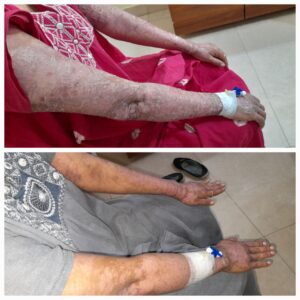
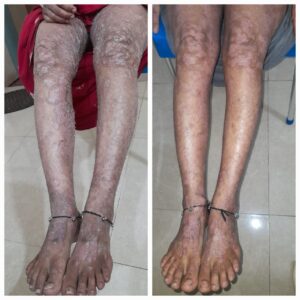
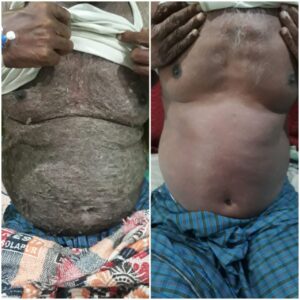


Get in Touch with us Today to Begin Your Journey of Transformation

Contact Us
- Dr.Ambalkars Aayurvedic Research Centre, ARC Bhavan, Vijay Vihar Complex, Evershine City, Last Stop, Vasai (E)
- drambalkar@yahoo.co.in
- +91 9320193201
- +91 9766362776

Developed By Scale Delight
Copyright © 2021 Ayurvedic Research Center, All Rights Reserved

